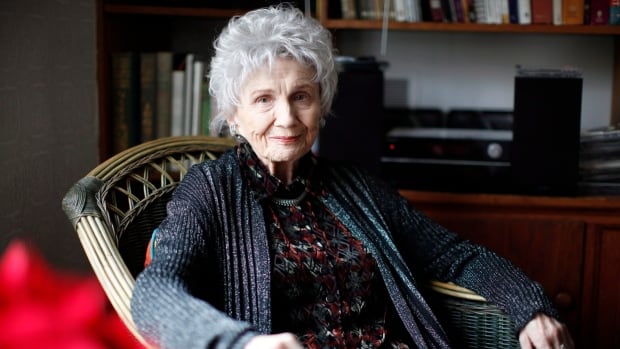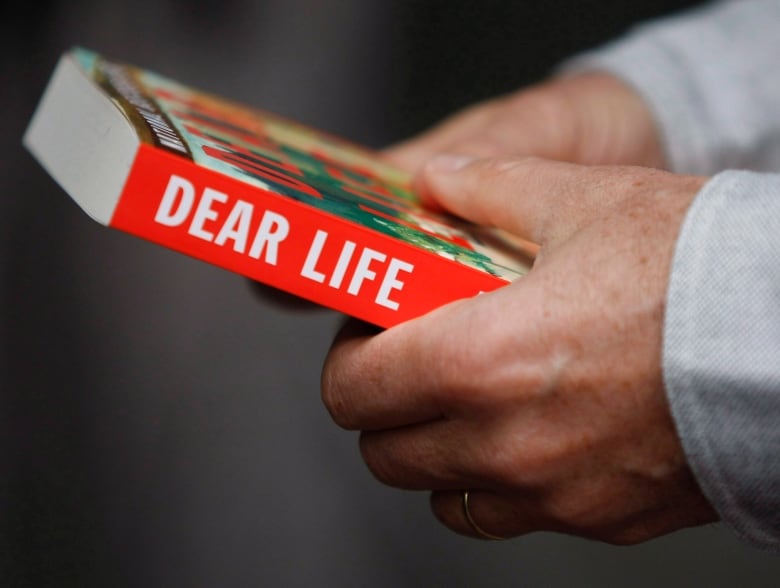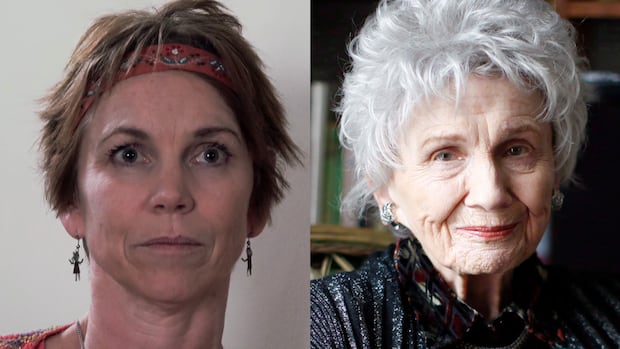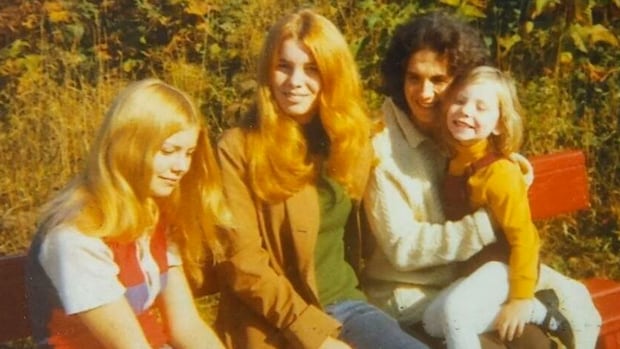
WARNING: This article contains details of abuse and may affect those who have experienced sexual violence or know someone affected by it.
When late author Alice Munro’s daughter came forward about the sexual abuse she suffered at the hands of her stepfather, the revelation stunned Canadians and the literary world.
But the fact that Munro’s biographer, Robert Thacker, also knew about the abuse of Andrea Skinner and didn’t include it has raised some thorny questions for biographers: what do they have a duty to include, and should they prioritize the concerns of their subject, their subject’s fans or the historical record.
“Robert Thacker had the story. He knew the story, and he acted in a very conventional and very traditional and — I’m sorry to say — a very Canadian way,” Ira Nadel, a biographer and professor emeritus of English at the University of British Columbia, told CBC in an interview.
Skinner was nine when her stepfather, the late author’s second husband, Gerald Fremlin, first sexually assaulted her.
Decades later, in March 2005, Fremlin pleaded guilty to indecent assault in a court case that, up until Wednesday, was subject to a publication ban. That ban prevented Skinner from being publicly identified.
In a newspaper column, Andrea Robin Skinner tells her story of suffering sexual abuse at the hands of her stepfather, Munro’s second husband. Skinner alleges that when Munro found out about the abuse years later, the late famed Canadian writer said it had nothing to do with her.
In stories published earlier this month by the Toronto Star, it was revealed that Munro turned her back on her daughter when Skinner informed her about the abuse. The author stayed with Fremlin until his death in 2013.
The stories also revealed Skinner’s desire to never “see another interview, biography or event that didn’t wrestle with the reality of what had happened to me.”
But the abuse was never mentioned in Thacker’s biography, Alice Munro: Writing Her Lives, which was published in November 2005, eight months after Fremlin’s guilty plea.
‘Private family matter’
Thacker, who declined to speak to CBC for this article, told the Globe and Mail that he was aware of Skinner’s assault and her subsequent estrangement from her mother but intentionally kept it out of his biography of Munro.
In interviews with the New York Times and the Washington Post, Thacker said he didn’t include Skinner’s experience because his book was already heading to print in 2005 when she contacted him, and he wasn’t writing a “tell-all biography.”
Thacker also chose to keep it out of the book’s 2011 update — even after Munro herself sat down with him, asked him to turn off the tape recorder and spoke to him about what happened. He said he viewed the situation “as a private family matter.”
Skinner says she was disappointed by Thacker’s decision not to include the story of her sexual assault at the hands of her stepfather.
Although the publication ban precluded publishing any evidence that would identify the victim, Skinner still wanted that information included in any writing about her mother. She believed only her name had to be kept out of print, she told CBC.
Earlier this month, Skinner petitioned to have the publication ban struck down. It was revoked on Wednesday by an Ontario Superior Court justice.
“Personally, I think when a convicted criminal lives inside a family, protected while the victim can no longer be part of that family, it’s collusion for a biographer to leave that information out,” she told CBC in an emailed statement. “It haunts me. Not just a ‘family matter.'”
A Canadian way
Nadel isn’t alone in his opinion that Canadian biographers often are too conservative. Other biographers, too, say there is a Canadian inclination to build up national heroes rather than engage with uncomfortable information, especially when the subject is still alive.
Nadel, who wrote Various Positions: A Life of Leonard Cohen while Cohen was still living and Philip Roth: A Counterlife, after Roth had died, said biographers can feel pressured to guard and shape a subject’s reputation.
That pressure leads to what Nadel describes as a uniquely Canadian way of writing biographies, in which the writer avoids engaging with who they are and choices they made and instead focuses on their work and chronological life events.
“It’s never about the significance of the figure,” he said. “It’s, ‘What did the figure do?'”
After Alice Munro’s youngest daughter said she was abused by her stepfather and her mother did not support her, conversations are emerging about how adults can best support child sexual abuse victims. Others are questioning how her daughter’s revelation complicates Munro’s legacy as a literary icon. CBC’s Chris Glover takes a closer look.
Fellow Canadian biographer Charlotte Gray says what a biographer chooses to include and exclude is fundamentally subjective, guided by the writer’s opinion of the person and their motivations.
That is part of how the work of a biographer is different from that of a historian, those “two ends of a spectrum of writing about the past,” she said.
The ultimate judgment is how the work is received as the years go by, Gray said.
She described a recent family trip with her sisters-in-law — four ardent fans of Munro, who felt personally betrayed by Skinner’s story
“I was so struck by that, in the way that — again and again — Alice Munro had struck a nerve in these women. And they thought, you know, ‘Oh, she really understands me,'” Gray said. “And then it turned out she wasn’t just like them at all.”
A biographer’s responsibility
The impulse to write a softened account of a subject’s life appears throughout the world of biography, said Rosemary Sullivan, a biographer and professor emeritus of English at the University of Toronto.
Fans often want so-called authorized biographies — ones in which the subject effectively commissions and edits a work about their lives.
“Just identifying the stories is not enough. You have to understand. We’re trying to understand,” said Sullivan.
Thacker, an avowed fan of Munro’s before embarking on Writing Her Lives, said in a June interview that Munro explicitly did not want an authorized biography. His focus for the book was Munro’s writing, not her “family life,” Thacker told Jonathan Eig of the Wall Street Journal.
“What I was really focused on was the texts and her evolution as a writer,” Thacker told Eig, while noting his close working relationship with Munro fed into that decision. “I think it was the right decision for the book I wanted to write.”

The result was an intentionally academic look at her life from a literary standpoint, from a literary expert.
That strategy caused one reviewer to assume Thacker, indeed, was “a non-invasive — and authorized — biographer.” Another review noted that the facts Thacker managed to carefully gather would be a “treasure trove for future scholars,” but said that while the “ingredients all seem to be there for a successful biography … the portrait of Munro that emerges from this biography is that of a nice but boring woman.”
Even with Fremlin’s guilty plea and Skinner’s desire to tell her story, the effort and legal hurdles to bring Skinner’s story to print would be enormous, Sullivan said.
The publication ban issued in the case was common in Canadian sexual assault cases under a section of the Criminal Code intended to protect a victim’s privacy. Victims who wanted to be identified could appeal to have the ban lifted, but those were not always successful.
Last year, the government of Canada introduced new legislation that gives victims more say in when, and whether, publication bans are imposed.
Ottawa Morning8:22Why do parents’ sometimes protect their children’s abusers?
Sex abuse allegations against Alice Munro’s husband highlighted the reality that abusers are often protected. As Beverley Chalmers, author of Child Sex Abuse: Power, Profit and Perversion, tells Ottawa Morning, the response is all too common.
Gray said the fact that Skinner and Munro both opened up about the events was “a huge opportunity to talk more deeply about the difference between the Alice Munro on the page and the Alice Munro in real life.”
Nadel agreed.
“We’re talking about the ethics of biography here. What are you going to do with it? And is it responsible to bury? I don’t think it is,” Nadel said. “There are many ways of handling these kinds of problems. But to avoid them completely, I think, is the worst.”
Winning trust
There have been many other works similarly criticized for omitting or glossing over uncomfortable aspects of the lives of their subjects, said Kelly McMasters, a memoirist and associate professor of English at Hofstra University in New York State.
Examples include Walter Isaacson’s biography of Steve Jobs, which was criticized for overly humanizing his negative traits, or biographies about Charles and Anne Lindbergh that ignored or excused the couple’s pro-Nazi stances.
These days, avoiding those realities would be seen as irresponsible, but the consideration on how deep to go is always a balancing act.
Biography is attractive to readers and writers because of both the creative and “potential destructive power of non-fiction,” McMasters said. In writing about those they admire, memoirists and biographers have the ability to — intentionally or not — harm or destroy relationships and reputations.
“So much of writing is about winning the trust of your reader,” said McMasters.
“And I think that’s where an authorized biography, or something coming to light about a writer, disrupts that trust.”
For anyone who has been sexually assaulted, there is support available through crisis lines and local support services via the Ending Violence Association of Canada database. If you’re in immediate danger or fear for your safety or that of others around you, please call 911.

